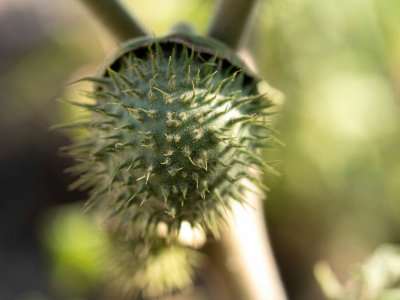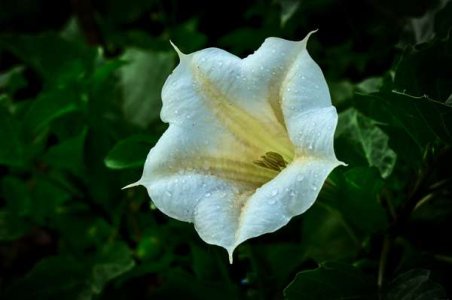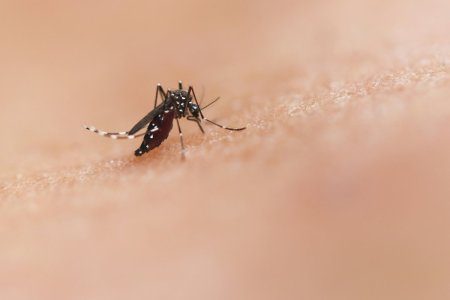This Dangerous Plant Can Ruin Your Health—Here’s How to Spot It Before It’s Too Late!
By
Aubrey Razon
- Replies 0
Content Warning: This article contains references to hallucinogens, hallucinations, delirium, poisoning, and death. Reader discretion is advised.
In nature, most plants are harmless and even helpful. But some, hidden among the greenery, can be dangerous if you're not careful. One such plant has recently gained notoriety on social media.
At The GrayVine, we believe that knowing the risks is key to staying safe outdoors. Let’s take a closer look at this dangerous plant and learn how to spot it before it's too late.
The story that has brought Datura plant, also known as Jimsonweed or Sacred Datura, into the spotlight comes from a social media user named Kirsten, who shared her harrowing experience with her followers.
While enjoying a sunset at her fiancé's parents' house, Kirsten encountered a peculiar plant growing by a cornfield.
It had captivating flowers and spiky seed pods that piqued her curiosity. Without knowing the plant's true nature, she touched and even smelled its seeds. It was only after researching it later that she discovered its dangerous properties.
Datura Stramonium, commonly referred to as Jimsonweed, moonflower, or thorn apple, is a wild plant found across the United States.
All parts of the plant contain toxic alkaloids such as scopolamine, hyoscyamine, and atropine. These substances can cause delirium, hallucinations, and in severe cases, fatal poisoning.
The plant is notorious for its hallucinogenic properties, which some individuals have sought out for a “trip,” often with disastrous consequences. The effects of Datura are not to be taken lightly; they can lead to a state of confusion, hyperthermia, tachycardia, bizarre behavior, and even death.
1. Do not touch: Avoid direct contact with the plant, as its toxins can be absorbed through the skin.
2. Do not ingest: Never consume any part of an unidentified plant, especially one that could be Datura.
3. Educate others: Share this information with friends and family, particularly those who enjoy foraging or spending time outdoors.
4. Report it: If you find Datura growing in public areas or places where children and pets play, consider reporting it to local authorities so they can manage the potential hazard.
While the beauty of nature is to be admired, caution and knowledge are our best tools for enjoying it safely. As we age, our connection to nature often becomes more profound. However, with this connection comes the responsibility to educate ourselves about the natural world, especially about plants that can harm us.

Have you ever encountered a plant in the wild that you later discovered was dangerous? Do you have tips for identifying toxic plants, or perhaps a story about a close call in nature? Share your experiences and advice in the comments below.
In nature, most plants are harmless and even helpful. But some, hidden among the greenery, can be dangerous if you're not careful. One such plant has recently gained notoriety on social media.
At The GrayVine, we believe that knowing the risks is key to staying safe outdoors. Let’s take a closer look at this dangerous plant and learn how to spot it before it's too late.
The Close Encounter with Datura
The story that has brought Datura plant, also known as Jimsonweed or Sacred Datura, into the spotlight comes from a social media user named Kirsten, who shared her harrowing experience with her followers.
While enjoying a sunset at her fiancé's parents' house, Kirsten encountered a peculiar plant growing by a cornfield.
It had captivating flowers and spiky seed pods that piqued her curiosity. Without knowing the plant's true nature, she touched and even smelled its seeds. It was only after researching it later that she discovered its dangerous properties.
Datura's Deadly Characteristics
Datura Stramonium, commonly referred to as Jimsonweed, moonflower, or thorn apple, is a wild plant found across the United States.
All parts of the plant contain toxic alkaloids such as scopolamine, hyoscyamine, and atropine. These substances can cause delirium, hallucinations, and in severe cases, fatal poisoning.
The plant is notorious for its hallucinogenic properties, which some individuals have sought out for a “trip,” often with disastrous consequences. The effects of Datura are not to be taken lightly; they can lead to a state of confusion, hyperthermia, tachycardia, bizarre behavior, and even death.
Identifying Datura
To protect yourself and your loved ones, it's crucial to recognize Datura. Here are some identifying features:Leaves
Datura has large, dark green to grayish leaves that are velvety in texture. They can cause skin irritation or dermatitis in sensitive individuals.Flowers
The flowers are trumpet-shaped, white to purplish in color, and can be six to seven inches long and five inches wide.Fruit
The fruit is a spiny greenish capsule that can be quite distinctive when mature.Habitat
Datura is commonly found along roadsides, in ditches, and sandy washes, typically at elevations between 1,000 to 6,000 feet.Safety Precautions
If you come across a plant that you suspect might be Datura, it's best to follow these safety precautions:1. Do not touch: Avoid direct contact with the plant, as its toxins can be absorbed through the skin.
2. Do not ingest: Never consume any part of an unidentified plant, especially one that could be Datura.
3. Educate others: Share this information with friends and family, particularly those who enjoy foraging or spending time outdoors.
4. Report it: If you find Datura growing in public areas or places where children and pets play, consider reporting it to local authorities so they can manage the potential hazard.
While the beauty of nature is to be admired, caution and knowledge are our best tools for enjoying it safely. As we age, our connection to nature often becomes more profound. However, with this connection comes the responsibility to educate ourselves about the natural world, especially about plants that can harm us.
Key Takeaways
- A social media user from Ohio shared her experience with the dangerous Datura plant, warning others of its highly toxic and hallucinogenic properties.
- The plant, also known as Jimsonweed or Moonflower, can cause intense hallucinations, delirium, and even death if ingested.
- Kirsten, the user who shared her experience with the plant on social media, and her fiancé encountered the plant by a cornfield and unknowingly interacted with it before discovering its true nature.
- Experts advise against consuming or touching unknown plants and the US Forest Service confirms that all parts of the Datura plant are poisonous.
Have you ever encountered a plant in the wild that you later discovered was dangerous? Do you have tips for identifying toxic plants, or perhaps a story about a close call in nature? Share your experiences and advice in the comments below.









